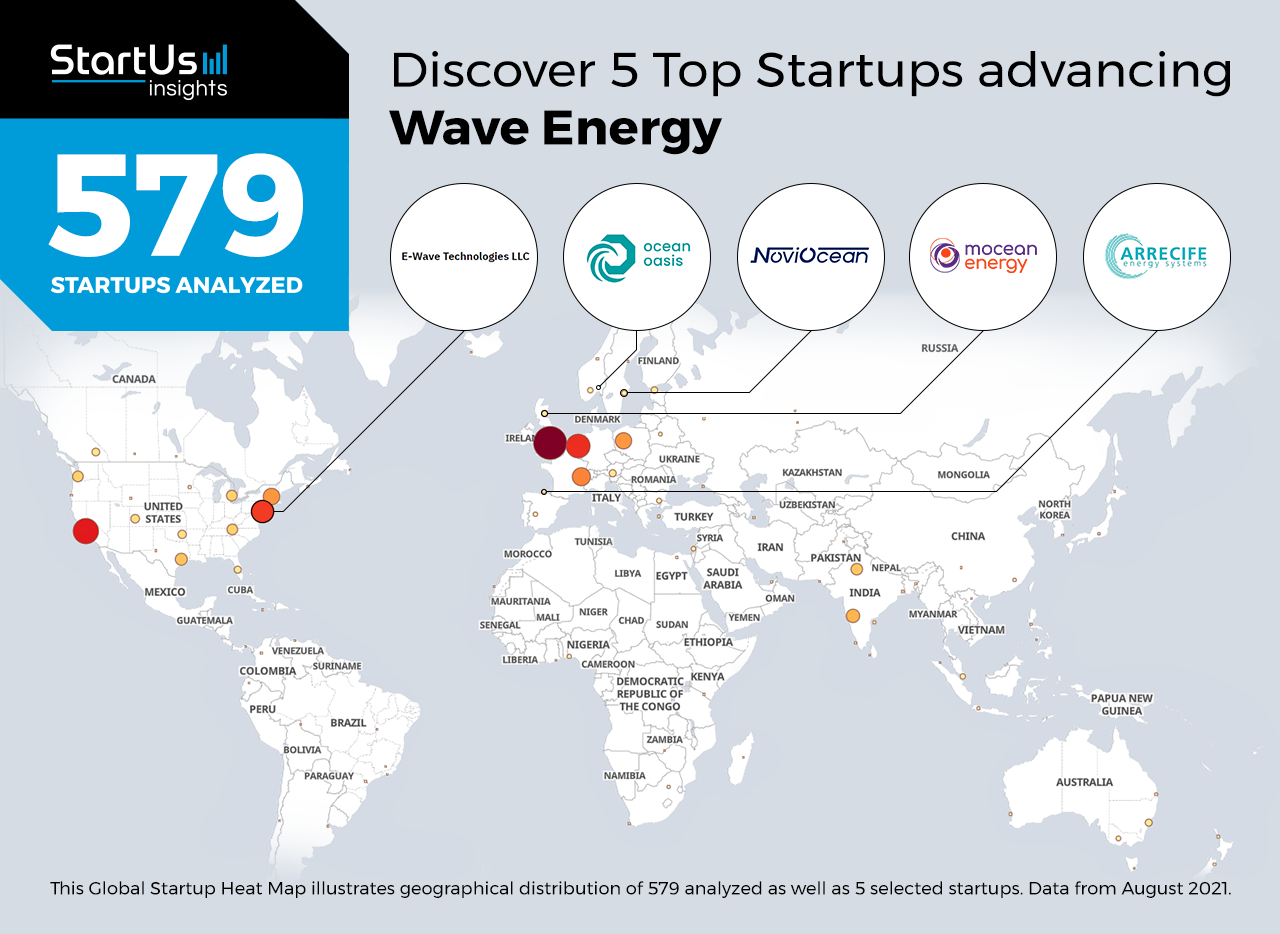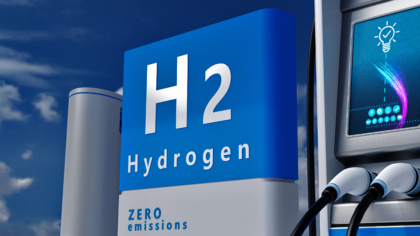Staying ahead of the technology curve means strengthening your competitive advantage. That is why we give you data-driven innovation insights into the energy industry. This time, you get to discover 5 hand-picked startups advancing wave energy.
Global Startup Heat Map highlights 5 Top Startups advancing Wave Energy out of 579
The insights of this data-driven analysis are derived from the Big Data & Artificial Intelligence-powered StartUs Insights Discovery Platform, covering 2.093.000+ startups & scaleups globally. The platform gives you an exhaustive overview of emerging technologies & relevant startups within a specific field in just a few clicks.
The Global Startup Heat Map below reveals the distribution of the 579 exemplary startups & scaleups we analyzed for this research. Further, it highlights 5 energy startups that we hand-picked based on criteria such as founding year, location, funding raised, and more. You get to explore the solutions of these 5 startups & scaleups in this report. For insights on the other 574 wave energy solutions, get in touch.
Arrecife Energy Systems designs Wave Energy Turbines
Wave energy is a feasible alternative to fossil fuel-based energy and has varied applications. One such application uses turbines to convert wave energy from river and ocean currents into electricity. However, not all turbines are anchorable to different depths, making them unviable for widespread implementation. The unavailability of anchoring further limits the adoption of such novel technologies. Thus, startups develop turbine solutions that are installable at varying depths.
Spanish startup Arrecife Energy Systems provides turbines that convert wave energy into electricity. The turbines obtain energy from waves, river currents, and tidal flows. They are available in three variants and consist of single-point mooring and anchors that enable installation at varying depths. A 750 W converter for low energy applications works in tandem with solar power systems while a two-turbine 1,5 kW converter supports higher energy applications. Finally, for even higher energy-consuming applications, the startup supplies up to 2 MW turbines.
NoviOcean develops Point Absorber Wave Energy Converters (WEC)
In wave energy generation sites, it is common to have access to wind energy as well. Moreover, advancements in ocean technology, such as non-resonant point absorbers, increase synergies between wind and wave energy systems. However, few options exist that integrate these technologies. To break this deadlock, startups develop wave energy converters that provide power while working in tandem with wind farms.
Swedish startup NoviOcean develops WEC for power generation. NoviOcean is a floating non-resonant point absorber WEC that extracts energy from the vertical motion of waves. It is a combination of two sub-systems, a rectangular float that resembles the shape of a wave in design and an inverted hydropower plant power take-off (PTO). The latter combines a water turbine and a hydraulic cylinder to pump high-pressure water at high velocity towards the turbine. NoviOcean improves the efficiency of the wave to energy conversion and enhances the levelized cost of energy (LCOE). Additionally, it optimizes operation and maintenance costs per unit of power, allowing for more effective utilization of the occupied area.
E-Wave Technologies provides Surge WEC
A major limitation in the adoption of wave energy technologies is low power generation capabilities. The LCOE for wave energy systems is significantly lower when compared to other renewables such as solar or wind energy. In particular, the surge WEC systems that use hydraulic PTO contribute to a decrease in overall efficiency. To tackle this, startups develop alternative PTO mechanisms for surge WEC to optimize energy efficiency.
US-based startup E-Wave Technologies manufactures E-Wave, a surge WEC. E-Wave‘s mechanical motion rectifier (MMR) transforms bidirectional pulse vibrations into unidirectional rotation at a steady speed to transform the motion of the waves into electricity. By using the MMR, the startup increases the power output of the wave energy system. E-Wave also provides benefits in coastal erosion protection and disaster mitigation and eliminates the risk of hydraulic fluid leakage.
Ocean Oasis offers Mobile Floating Desalination Plants
The scarcity of freshwater across the globe prompts advancements in alternatives that suitably address future challenges. Desalination plants provide an opportunity for arid and coastal regions to convert saltwater into freshwater. However, these technologies require large areas of land, energy, and expense to set up. Besides, most desalination plants still rely on fossil fuels, making any efforts unsustainable. To solve these challenges, startups innovate zero-emission desalination technologies that utilize wave energy.
Norwegian startup Ocean Oasis provides mobile floating desalination plants. The offshore plants use wave energy to desalinate saltwater and the desalinator delivers fresh water to the shore through pipes along the seabed. Each unit has an annual production of approximately 5 84 000 m3 of freshwater. Moreover, the solution produces zero emissions and does not require land for operations. Ocean Oasis also offers a build-own-operate (BOO) model where it builds, operates, and maintains the desalination plant, as well as delivers potable water to customers.
Mocean Energy engineers Utility-Scale WEC
Renewable energy sources increasingly compete with fossil fuels for power generation in many regions across the world. Wave energy is particularly suitable for coastal locations due to the perpetually flowing nature of waves. However, most solutions only manage small-scale electricity generation. Thinking about the future, startups develop utility-scale WEC to power entire cities and regions.
British startup Mocean Energy develops wave energy technologies. Blue Horizon is the startup’s utility-scale wave energy system that offers green energy to consumers on the grid. It utilizes a purpose-built PTO generator called C-GEN and aims to provide grid-scale electricity. Besides, the startup develops Blue Star, a WEC that delivers energy to power a range of subsea applications, including subsea control systems, remotely operated vehicles (ROV), and autonomous underwater vehicles.
Discover more Energy Startups
Energy startups such as the examples highlighted in this report focus on wave energy converters and turbines, desalination plants that run on wave energy as well as utility-scale WEC. While all of these technologies play a major role in advancing the energy industry, they only represent the tip of the iceberg. To explore more energy technologies, simply get in touch to let us look into your areas of interest. For a more general overview, you can download our free Energy Innovation Report to save your time and improve strategic decision-making.







